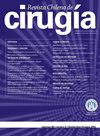外伤继发膈疝:晚期表现
Q4 Medicine
引用次数: 0
摘要
外伤性膈疝的晚期表现构成了真正的外科急诊。本研究的目的是描述晚期表现的膈疝的诊断特征、治疗和结果,并确定从症状开始到坏死发展的截断点。患者与方法:回顾性分析2006 - 2016年急诊膈疝修补术患者的病例。分类变量和连续变量用描述性统计进行测量和分析。使用症状出现后6小时和12小时的受试者工作特征(ROC)曲线来确定器官切除的截止点。一旦建立截断点,计算敏感性、特异性、阳性预测值和阴性预测值以及患病率。结果:临床表现,诊断研究和手术治疗与已经描述的相似。截止点定义为症状开始后12小时,敏感性为80%,敏感性为83%。结论:这些病例应在出现症状后6小时前进行诊断和治疗。尽管这项研究的范围很小,但我们可能认为,在症状出现12小时后,相关器官将被发现坏死,需要手术切除。本文章由计算机程序翻译,如有差异,请以英文原文为准。
Hernia diafragmática secundaria a trauma: presentación tardía
Introduction: Late presentation of traumatic diaphragmatic hernia constitutes a true surgical emergency. The purposes of this study were to describe the diagnostic characteristics, treatment and outcomes of late presentation diaphragmatic hernias and to identify a cutoff point from the onset of symptoms to necrosis development. Patients and Methods: A retrospective series of cases constituted by all patients subjected to emergency diaphragmatic hernia repair form 2006 to 2016 was studied. Categorical and continuous variables were measured and analyzed with descriptive statistics. Receiver Operating Characteristics (ROC) curves at 6 and 12 hours from the onset of symptoms were used to determine the cutoff point for organ resection. Once stablished the cutoff point, sensitivity, specificity, positive and negative predictive values and prevalence were calculated. Results: Clinical presentation, diagnostic study and surgical treatment were similar to what has been already described. The cutoff point was defined at 12 hours from the onset of symptoms with 80% sensitivity and 83% sensibility. Conclusions: The diagnosis and treatment of these cases should be carried on before the first 6 hours after the onset of symptoms. Even though the universe of this study was small, we may suggest that after 12 hours form the onset of symptoms, the implicated organs would be found necrotic requiring surgical resection.
求助全文
通过发布文献求助,成功后即可免费获取论文全文。
去求助
来源期刊

Revista Chilena De Cirugia
Medicine-Surgery
CiteScore
0.20
自引率
0.00%
发文量
0
审稿时长
6-12 weeks
期刊介绍:
La Revista Chilena de Cirugía es un órgano de difusión del conocimiento y actividad quirúrgica. Su población objetivo son cirujanos, especialistas de otras áreas médicas, médicos generales y alumnos del área de la salud.
Sirve a cirujanos y otros especialistas, para publicar artículos originales e inéditos sobre temas médicos, en particular artículos de investigación básica y clínica, artículos de revisión, entre otros.
Buscan difundir y actualizar el conocimiento médico general y quirúrgico en particular. Se publica en forma bimestral.
La Revista Chilena de Cirugía está afiliada y patrocinada por la Sociedad de Cirujanos de Chilese desde el año 1952.
 求助内容:
求助内容: 应助结果提醒方式:
应助结果提醒方式:


